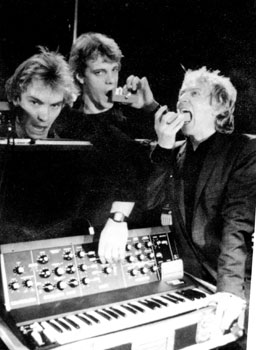
The Police

(consuming what appear to be guitar effects pedals)
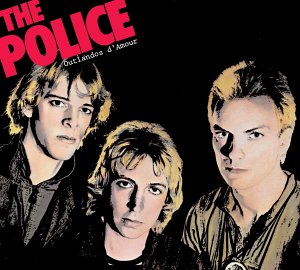
Outlandos d'Amour (1978)
1) Next to You, 2) So Lonely, 3) Roxanne, 4) Holes In My Life, 5) Peanuts, 6) Can't Stand Losing You, 7) Truth Hits Everybody, 8) Born In the 50's, 9) Be My Girl - Sally, 10) Masoko Tanga
And so, evidenced with energetic songs like the opener "Next to You," "Born In the 50's" and "Peanuts," Outlandos is indeed more of a punk album than any other genre. That's not to say the record is inherently bad (you can't tell that I don't like punk, right?) as there is still quite a bit of the signature Summers guitar and Copeland drums to make it through the 10-tracks of the collaboration. "Can't Stand Losing You" and "Roxanne" are both based on ska guitar riffs with Sting's reggae bass playing and a sufficient amount of non-punk drumming via Stewart. Probably one of my favorite attributes of Outlandos is Sting's melody and harmony vocals, which are done so elegantly on the choruses of "So Lonely" and "Can't Stand Losing You." Also, the guitar solos are quite prevalent throughout the album, from a tasty sample of phased octave-harmonic doodling in "Can't Stand..." to a drawn-out effort towards the conclusion of "So Lonely" (just to let all the readers know that I'm not completely full of crap, I was laughing quite profoundly while composing and rereading that last sentence). Even in "Peanuts," there is an excellent half-minute section of Summers showing off his chops. And so, I conclude, the Police played punk the way that it was meant to be played... and when I say the way it was meant to be played, I mean the way that I think it should have been played... and by the way I think it should have been played, I mean that punk sucks and the Police can do anything they want and I'll still love it (except for the song "Mother"... that's devil music... :::angrily shakes a fist at Andy Summers:::).
As an afterthought, "Roxanne," the song that turned out to be the Police's signature single (along with "Every Breath You Take"), actually flopped when it was released in 1978 and it wasn't until Regatta de Blanc was released the next year that the group started gaining such widespread attention. (Updated: 2/12/2004)
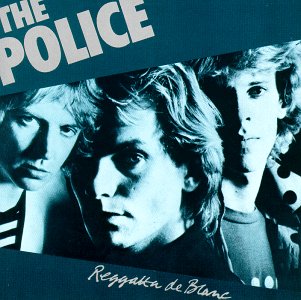
Regatta de Blanc (1979)
1) Message In a Bottle, 2) Regatta de Blanc, 3) It's Alright For You, 4) Bring On the Night, 5) Deathwish, 6) Walking On the Moon, 7) On Any Other Day, 8) Bed's Too Big Without You, 9) Contact, 10) Does Everyone Stare, 11) No Time This Time
The second major Police release also firmly established many of the true sounds of the group, from Sting's weird obsession with reggae to Andy Summers' overuse of his phaser guitar pedal to Stewart Copeland's cool digital delay effects on his drums. Ironically, this was the album that established the Police as a mainstream rock group even though they sounded much less like the punk music of the time.
Most notably (and I think I'm going to dedicate the following paragraph to this subject), the Regatta sessions spawned the single "Message In a Bottle," which Sting said was his favorite of all the songs he'd ever written (though he said so in 1979 and a bit of time has passed since then). More than "Roxanne" or "Every Breath You Take," I think "Message In a Bottle" is the greatest pop song of all time. Though the song sounds fairly straightforward, there are a ridiculous number of nuances to it that made it almost impossible to replicate live with at least 5 band members. The Police (in their arrogance, so it would seem) never had any extra musicians in concert with them (same two female back-up singers in the later years), so all the live guitarwork was left up to Andy. The problem with only one musician playing guitar on this song is that there are as many as three guitar parts being played at the same time on the recorded version. First, there's the signature guitar riff (the arpeggiated 5th-add-9 chords), and after 6 years of playing the guitar I'm still trying to completely perfect that riff. On top of the main riff, there is a harmony guitar riff which requires a second guitarist to play along. Finally, by the close of the song both the main riff and harmony riff are being played along with the very nice outro lead guitar. Sting's bass guitar is simple, but still beautifully appropriate. Copeland's drums are, as usual, astounding; I recall trying to transcribe them on a PC music program that will play the transcriptions back to the user, and Stewart's hi-hat fills alone took forever to figure out. So, needless to say, it's a kick-ass song.
The instrumental title track is another of my favorite songs, which opens with Copeland's digitally delayed bass drums, hi-hat, and rimshots, Summers' chorused guitar riffs, and Sting's various nonsensical speech recordings (at one point he yells, "Ay yi yi yi yi!"). From there, the song quickly degrades into a steady rock sound along with Sting chanting like an idiot. In fact, I read somewhere that "Regatta de Blance" won a Grammy for the best instrumental track the year this record came out. "Bring On the Night," a song Sting would later perform as a solo artist, opens with what seems to be a phased bass and some beautiful classical-sounding guitar arpeggios. "Walking On the Moon" features more delayed drums, along with a memorable bass riff and some cool phased guitar sounds, along with a some ska verse chords. "The Bed's Too Big Without You" is probably the most reggae-sounding of all the Regatta tracks, and though Sting sings reggae about as well as Johnny Cash would, the guitar, bass, and drums are still great. Another very cool song is "Does Everyone Stare," which features a neat piano/vocal intro. Ah, yes, and who could forget "On Any Other Day," the track co-authored by and featuring the lead vocals of Stewart Copeland. Yeah, it's that bad. (Updated: 2/12/2004)
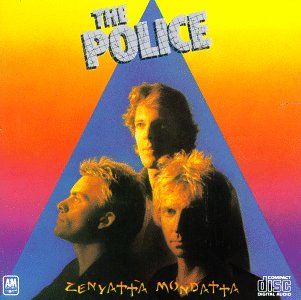
Zenyatta Mondatta (1980)
1) Don't Stand So Close to Me, 2) Driven to Tears, 3) When the World Is Running Down You Make the Best of What's Still Around, 4) Canary In a Coalmine, 5) Voices Inside My Head, 6) Bombs Away, 7) De Do Do Do, De Da Da Da, 8) Behind My Camel, 9) Man In a Suitcase, 10) Shadows In the Rain, 11) Other Way of Stopping
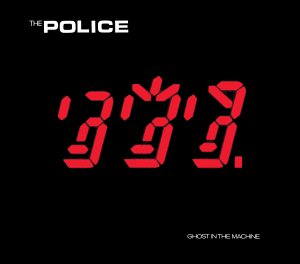
Ghost In the Machine (1981)
1) Spirits In the Material World, 2) Every Little Thing She Does Is Magic, 3) Invisible Sun, 4) Hungry For You, 5) Demolition Man, 6) Too Much Information, 7) Rehumanize Yourself, 8) One World (Not Three), 9) Omegaman, 10) Secret Journey, 11) Darkness
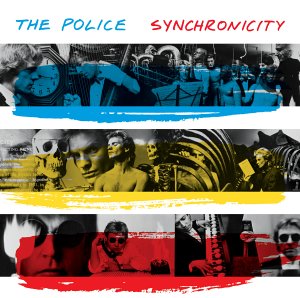
Synchronicity (1983)
1) Synchronicity, 2) Walking In Your Footsteps, 3) O My God, 4) Mother, 5) Miss Gradenko, 6) Synchronicity II, 7) Every Breath You Take, 8) King of Pain, 9) Wrapped Around Your Finger, 10) Tea In the Sahara
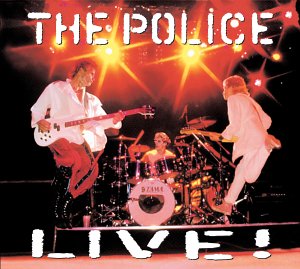
The Police Live! (1995)
Disc 1: 1) Next to You, 2) So Lonely, 3) Truth Hits Everybody, 4) Walking On the Moon, 5) Hole In My Life, 6) Fall Out, 7) Bring On the Night, 8) Message In a Bottle, 9) The Bed's Too Big Without You, 10) Peanuts, 11) Roxanne, 12) Can't Stand Losing You, 13) Landlord, 14) Born In the 50's, 15) Be My Girl/Sally
Disc 2: 1) Synchronicity I, 2) Synchronicity II, 3) Walking In Your Footsteps, 4) Message In a Bottle, 5) O My God, 6) De Do Do Do, De Da Da Da, 7) Wrapped Around Your Finger, 8) Tea In the Sahara, 9) Spirits In the Material World, 10) King of Pain, 11) Don't Stand So Close to Me, 12) Every Breath You Take, 13) Roxanne, 14) Can't Stand Losing You, 15) So Lonely
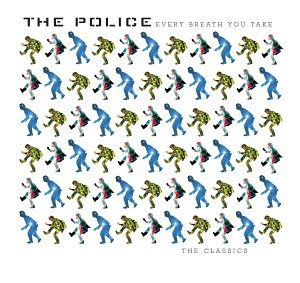
Every Breath You Take: The Classics (1995)
1) Roxanne, 2) Can't Stand Losing You, 3) Message In a Bottle, 4) Walking On the Moon, 5) Don't Stand So Close to Me, 6) De Do Do Do, De Da Da Da, 7) Every Little Thing She Does Is Magic, 8) Invisible Sun, 9) Spirits In the Material World, 10) Every Breath You Take, 11) King of Pain, 12) Wrapped Your Finger, 13) Don't Stand So Close to Me '86, 14) Message In a Bottle (classic rock remix)
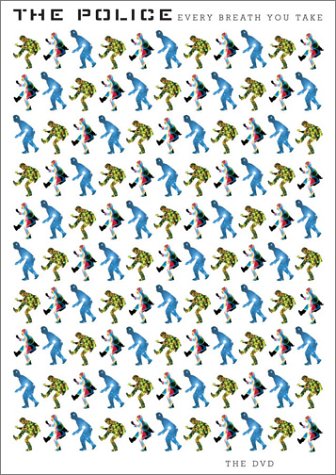
Every Breath You Take: The DVD (2002)